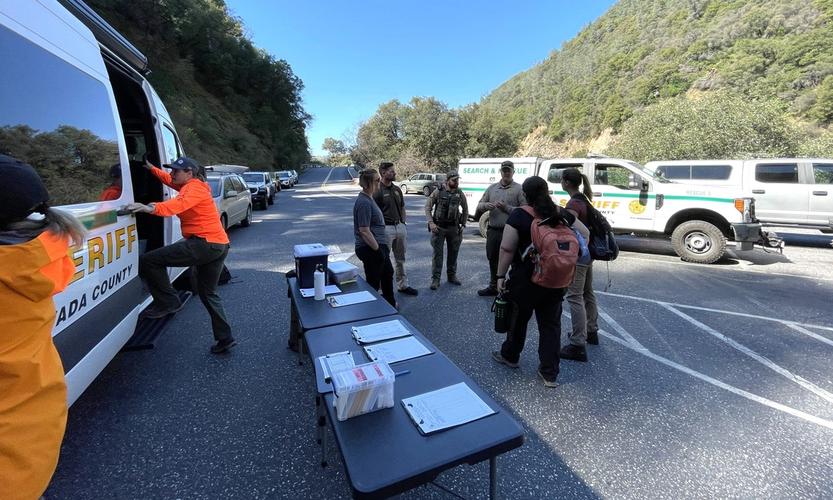Supervisors Oppose AT&T Landline-Ditching Efforts
February 8, 2024
SIERRA COUNTY — On Tuesday, the Board of Supervisors voted unanimously to approve sending the following letter written by Supervisor Lee Adams, which opposes AT&T’s application to end their Carrier of Last Resort responsibility across the state. The letter was mailed to Hon. Megan Dahle, California State Assembly, 1st District; Hon. Brian Dahle, California State Senate, 1st District; Leigh Kammerich, Policy Advocate, Rural County Representatives of California; and Jacqueline Wong-Hernandez, Legislative Affairs Chief, California State Association of Counties. Madam/Sir: Please consider this letter a protest to the above applications, and a request from the County of Sierra that you deny both of these applications by AT&T California. No doubt you have heard many concerns from rural California, and the AT&T service area of western Sierra County is some of the most rural in the state. Over the past few decades, AT&T’s business model has been extremely detrimental to the safety of all in Sierra County, whether it be to residents or visitors to the county. AT&T deployed U-verse platform telephone service by offering it as a reduced rate option for copper-based lines. In doing so, they neglected to explain its inability to work during times of power outages, something that happens frequently due to our weather and geographic demographics. Many customers changed, and they had to fight hard to get their copper service restored once they experienced telephone service loss during power outages. Due to our geographic and rural demographic setting, cellular service is quite limited even within our townsites, and when available, it too is supported mostly by extenders within residential U-verse systems. And it too is fraught with reliability issues due to weather and other emergency situations. Sierra County elevations range from 2,200 to 8,900 feet, with heavy snow and winter conditions a common occurrence here. That winter weather brings with it power outages that kill non-copper-based phone systems. In the peak of our summer fire season, public safety power shutoffs (PSPS) occur when our local communities are at their biggest risk of wildfire, and then too, non-copper-based phone systems fail. As well, a number of western Sierra County fire agency dispatch services rely on copper-based phones in order to have consistent communication dispatch abilities. In addition, AT&T has made public telephones an endangered species and we can only identify two in western Sierra County. In the past they were a presence in every western Sierra County community, with at least four in our county seat of Downieville (and today there are none). Anyone traveling needs to try and find a U-verse based hot spot or try and find an open business during an emergency. During times of power outages, they are without any option of communication. In its applications, AT&T notes there are nine wire centers with only one ‘alternative’ to AT&T services (and three of those wire centers are in Sierra County). They also note these nine wire centers only support 110 lifeline customers, and .02% of their customers are system wide. Their statement infers that the customers in these nine wire centers are not worth worrying about due to their limited numbers. We find those statements demeaning. The one ‘alternative’ they offer is a company located in the state of Wyoming and for which this board has no institutional history. Should a company like AT&T as a regulated utility wish to do business in California, they should not be allowed to operate in areas with a larger profit margin while trying to escape their mandated operations in less lucrative areas. While Sierra County is home to 3,000 residents, its landmass is comprised of 70% national forest system lands with visitors year around that far exceeds our permanent population. Additionally, state route 49 and its Yuba Pass is often an alternative winter travel route to a closed or snow impacted Donner Summit. In 1936, the Rural Electrification Act was passed by congress in order to close the gap and bring reliable electrical power to farms and other rural areas. When adopted, 3% of farms had commercial electrical power, and by 1956 some 90% of those farms were so served. Sadly, the gap between urban and rural areas on the subject of both cellular and broadband service remains huge. Instead of allowing AT&T to make the situation worse in their rural California service area, please deny these applications and instead encourage, or better yet, mandate them to enhance the services in these areas to what they once were and to what urban areas have today. Sincerely, SIERRA COUNTY BOARD OF SUPERVISORS
Featured Articles

Human Remains Found Near South Yuba Bridge in March Identified →
December 17, 2025
Authorities identify remains found in March as Aaran Sloan Taylor, seeking next of kin.
Transfer Station Burn Suspended After Community Concerns →
December 16, 2025
Sierra Hardware Plans Extensive Repairs After Flood Damage →
December 8, 2025
Sheriff’s Office Accepts $60,000 Grant for New Search and Rescue Team →
December 2, 2025
Confusion Surrounds Release of the Plumas County Grand Jury’s Report →
December 4, 2025